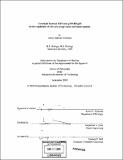Crosstalk between E2F3 and p19ARF/p53 in the regulation of cell cycle progression and tumorigenesis
Author(s)
Aslanian, Aaron Spencer
DownloadFull printable version (11.51Mb)
Other Contributors
Massachusetts Institute of Technology. Dept. of Biology.
Advisor
Jacqueline A. Lees.
Terms of use
Metadata
Show full item recordAbstract
E2F activity was originally identified as a critical component of the cellular machinery responsible for promoting cell cycle progression that is co-opted during transformation and tumorigenesis. Classic E2F target genes have functions required for S-phase entry and progression. However, the role of E2F has expanded in recent years through the identification of novel E2F target genes. Now E2F is linked to many different cellular processes beyond basic cell cycle control. One such example is p19ARF, a positive upstream regulator of the p53 tumor suppressor protein. This dissertation examines the relationship between one member of the E2F family of transcription factors, E2F3, and the p19ARF/p53 pathway. E2F3 has previously been shown to be critical for cell cycle re-entry, cellular proliferation, and tumor development. The contribution of p19ARF/p53 to E2F3 function was assessed through the generation of compound mutant cells and mice. The nature of the relationship between E2F3, p19ARF, and p53 was highly context dependent. E2F3 is required to repress pl9Arf expression in quiescent cells. This places E2F3 upstream of p19ARF and p53 during cell cycle re-entry. (cont.) The loss of either p9Arf or p53 completely suppresses the cell cycle re-entry defects in E2f3-deficient cells. In contrast, E2f3-loss impairs the proliferation of both p19Arf and p53 knockout cells that are cycling asynchronously. In this setting, E2F3 appears to function primarily through pl9Arf-independent mechanisms. Additionally, the impairment of cellular proliferation in this setting occurs without any detectable defect in classic E2F target gene expression. Finally, the effect of E2f3-loss in transformation and tumorigenesis appears to depend on the underlying genetic alterations. In the background of pl9Arf-deficiency, E2f3-loss impairs tranformation and tumorigenesis. However, in the background of p53- deficiency, E2f3-loss has no effect on transformation or tumorigenesis. This distinction between p19ARF and p53 also suggests that the regulation of cellular proliferation cannot be the only function of E2F3 relevant to transformation and tumorigenesis. This work has established that the loss of E2f3 has multiple effects on cells that are relevant to tumor biology. As these roles become more clearly defined, we will gain a better understanding of what are the consequences of E2F activity deregulation.
Description
Thesis (Ph. D.)--Massachusetts Institute of Technology, Dept. of Biology, 2005. Includes bibliographical references.
Date issued
2005Department
Massachusetts Institute of Technology. Department of BiologyPublisher
Massachusetts Institute of Technology
Keywords
Biology.